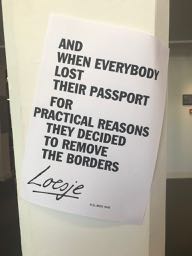As part of my tenure-track evaluation I held a public lecture at the end of April 2020 at the University of Konstanz on the topic of statelessness. I am currently in the process of drafting a funding application that would enable me to work towards developing how an anthropology of statelessness could look like.
I’d like to mention a couple of thoughts here to help me think through this potential new subdiscipline and to raise awareness of what I think is a structural lack at two different levels:
1) within the very concept of the nation-state and
2) within the anthropology of the state.
While the first concerns the prime object of analysis of the anthropology of the state, the second concerns a structural lack within how we have up to date researched that prime object.
I argue that statelessness has so far been approached as something ‘lacking’ in the constitution of those who do not have a nationality — for whatever reason (and there are many). Thus, activists, practitioners, (I)NGOs and other global actors have focussed their attention on ‘fixing’ the lack of the stateless by trying to make sure they, too, receive nationality (or citizenship; I won’t go into details here as to where these concepts overlap and where they don’t). In doing so, statelessness has remained an ‘anomaly’ — something that needs ‘fixing’. But we have neglected (almost entirely) in our scholarly analyses (these are mostly legal, political and almost none anthropological up to date) that it might not be the stateless who need ‘fixing’, but the nation-state itself. This argument has been made by the political theorist Phil Cole (2017), for example, but needs to be taken seriously and thought through in legal and political anthropology as well for it might provide novel insights into the anthropology of the state.
Understanding statelessness as a structural lack of nation-states
In my tenure lecture, I have argued that statelessness cannot be researched at the ‘heart of the state’ (Fassin) or at its ‘margins’ (Das and Poole) where anthropology has so far located its objects of inquiry when studying the state in a transversal or tangential (Harvey) manner. It rather points to what I – with Lacan – would define as a structural lack in how nation-states are set up and operate. As such, this type of lack is not meant to be ‘filled’. As much as statelessness is not a mode of being that could be ‘fixed’, the structural lack that statelessness opens up  within the concept of the nation-state is not meant to be ‘filled’. It is there on purpose, I argue. Treating statelessness not as anomaly, but as an intentional product in the way the state operates allows for new insights into the state as much as it will move our engagement with the phenomenon of statelessness beyond appeals of ‘fixing’.
within the concept of the nation-state is not meant to be ‘filled’. It is there on purpose, I argue. Treating statelessness not as anomaly, but as an intentional product in the way the state operates allows for new insights into the state as much as it will move our engagement with the phenomenon of statelessness beyond appeals of ‘fixing’.
As much as statelessness is not a mode of being that could be ‘fixed’, the structural lack that statelessness opens up within the concept of the nation-state is not meant to be ‘filled’.
Despite the fact that we have international conventions in place since the mid 1950s, and despite the fact that more and more states have ratified these conventions and are closing legal loopholes: statelessness continues to exist and in many parts of the world, including Europe, its numbers are increasing. It remains one of the most overlooked human rights violations and it won’t go away, no matter how much the UN wants it to. The project I am currently drafting would bring legal scholars, anthropologists and practitioners together and study the structural lack of statelessness as an intrinsic component of the nation-state.
From stateless societies to stateless individuals
Anthropologists have historically dealt with stateless societies as part of Europe’s (and America’s) colonial politics of expansion and exploitation. Most ethnographic monographs centred on ‘acephalous’ ethnic groups or tried to grapple with understanding how groups organized and interacted with one another without a clear leadership or someone ‘in power’. After the demise of colonialism, such work has almost completely come to a halt; the state has come to tighten its grip on ethnic groups to such an extent that there is, by now, no place on earth that would not feel its eery presence. This includes hunter-gatherer societies (Sapignoli 2018) and sedentary tribes (Girke 2018) in rural Africa as much as agrarian groups in Southeast Asia (Scott 2010). However, statelessness has remained an immanent phenomenon worth anthropological attention. My argument is, however, that nowadays we need to focus on stateless individuals (in the sense of an anthropo-logy) more than on stateless societies (in the sense of an ethno-logy). While many groups are de facto stateless (e.g. Rohingya), the de jure status of statelessness is granted to individuals only. In line with an existential anthropology (Jackson and Piette 2015), my aim is to research statelessness not as a historical leftover of group encounters with the (colonial) state, but as an existential human condition that allows us to understands a structural lack of the contemporary nation-state.
Stay tuned …
